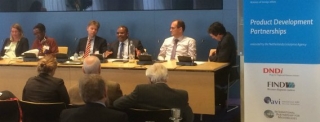Report of the Annual Meeting PDP - Access to Medicine
On 13 April 2017 the Ministry of Foreign Affairs hosted the annual PDP meeting. The theme given to this day was “Access to Medicine”.
During the morning session with the PDPs and Dutch policy makers each spoke of how they look at access to medicines from their own organisations. The policy makers made it clear that this subject was no longer only relevant for developing countries but increasingly for the Western World as well.
Reaching the patient
The PDPs have made considerable progress in previous years in pushing the development of medicines, vaccines and diagnostics further down the pipeline, often with assistance from the Dutch government. The PDPs also stressed that all aspects involved in reaching the patient is becoming more and more important. Access to medicines should therefore be on the agenda right from the start, which is not always the case.
One of the topics was the need for an evidence base and (regional) data for improving access: data on the diseases , populations, locations, storage, use of medicine, pricing etc). This will help in introducing new products and reducing the chance of failure in this process.
Support and commitment from governments
Long-term investment in the development of medicines, vaccines and diagnostics is crucial as it takes years to develop market products that are ready for the market. Support and commitment from governments in involved countries is indispensable when it comes to registering and distribution of the medicines as well as adjusting the necessary policy.
In the afternoon Health~Holland highlighted the benefits of working with Dutch partners, giving a clear overview to the PDPs that are looking for further cooperation with the Dutch Life Sciences & Health sector.
Entrepreneurial mindset
IPM (International Partnership For Microbicides) and IAVI (International AIDS Vaccine Initiative) presented two cases together with Janssen Pharmaceutical Companies whereby they talked about the different interests of a PDP vs a company and the benefits of working in a partnership. Janssen for example assists IPM in market introduction and IPMs offers Janssen the possibility to move forward with a product that has an unknown regulatory path. IAVI mentioned the entrepreneurial mindset of ‘the industry’ as while the companies can build knowledge and create a learning environment and lower their risks.
Panel discussion
The panel discussion at the end of the day, moderated by Jayasree Iyer of the Access to Medicine Foundation, answered some questions about increasing productivity of PDPs. Other participants in the panel were: FIND (Foundation for Innovative New Diagnostics), DNDi (Drugs for Neglected Diseases initiative), Lygature, EDCTP, TB Alliance, MMV (Medicines for Malaria Venture).
Success and fail factors in access to medicine
The panelists confirmed that their organisations have undergone an evolutionary process to get to the point where they are today. For example, MMV (Jagoe) and TB Alliance (Brock) are seen as professional partners by the organisations in their PDPs. Speaking of success and fail factors, Mr Brock indicated their main challenge is getting multiple pharmaceutical companies to work together well, in order to effectively combine various medicines in a single medical regime. All participants signaled their PDPs have indeed evolved from bilateral to multilateral organisations.
In conclusion: a lot of information was exchanged between PDPs and the Dutch Life Sciences & Health sector whereby contacts were made, hopefully for further cooperation .

